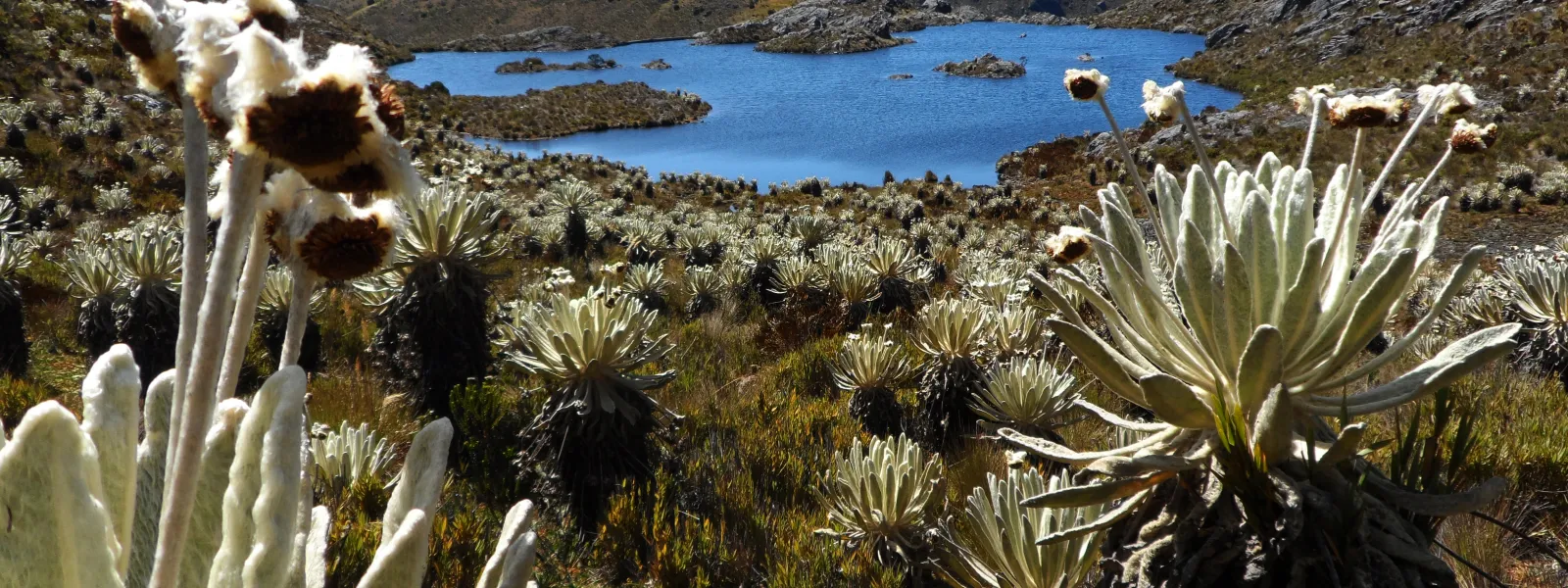
Project
Photo: Alberto Peña KayProtecting the Santurban Páramo from mining's damages
In the Andean region, high-altitude forests and wetlands called páramos capture water from fog and supply it to lowlands. In Colombia, nearly two million people rely on the Santurbán páramo for their freshwater supply.
Healthy páramos also capture large amounts of carbon, mitigating climate change, and provide refuge for hundreds of threatened species, including the iconic spectacled bear.
The land in and around the Santurbán páramo contains gold and other minerals. A Canadian corporation, Eco Oro minerals, wants to build a gold mine that would leak large amounts of cyanide and arsenic into the water coming from the páramo.
AIDA’s advocacy helped to convince the Colombian government to:
- Deny an environmental license for the Angostura mine in May 2011.
- Protect, in 2013, 76 percent of the Santurbán páramo from industrial activities—a much larger percentage than originally proposed
Together with our partners, AIDA advocated for the World Bank's divestment from the Angostura mining project, which we achieved in December 2016.
We also supported litigation that led Colombia’s highest court to reaffirm in February 2016 that mining in páramos is prohibited.
However, 24 percent of the Santurbán remains unprotected because it was not officially designated a páramo during the government's delimitation process, which was invalidated by a court system in November 2017 due to failure to consult with affected communities.
The government must now realize a new delimitation process in consultation with residents of the area. Meanwhile, the threats to Santurbán continue, with Eco Oro still angling to build its mine and another mining project seeking establishment nearby.
Partners:
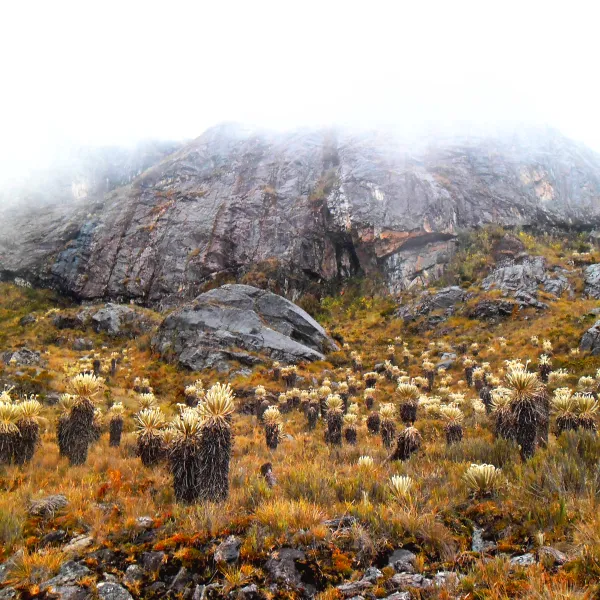
Related projects
Latest News
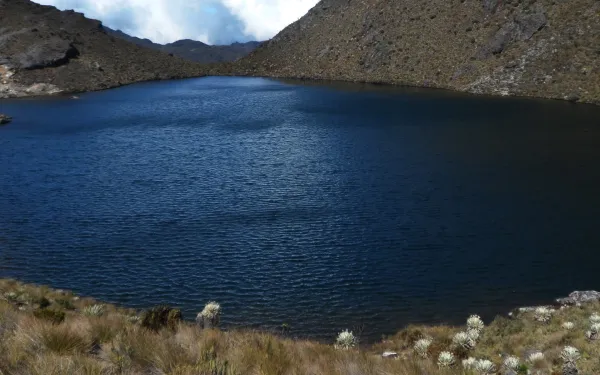
UN experts denounce threats and stigmatization against defenders of water and the Santurbán páramo; demand protection for their work
Bucaramanga, Colombia. On March 6, 2025 the United Nations Special Rapporteurs on human rights defenders, a healthy environment, water and sanitation, and the UN Working Group on Business and Human Rights sent formal letters to the governments of Colombia, Canada, and the United Arab Emirates, as well as to the companies Aris Mining and MDC Industry Holding Company LLC to denounce the threats and stigmatization faced by the Committee for the Defence of Water and the Santurbán Páramo for defending this ecosystem threatened by mining in Colombia. To date, only the Colombian government’s reply has been made public. While harassment is not new, content has recently been disseminated on social media labeling the Committee’s spokespersons as "persona non grata", endangering their lives by claiming false connections to illegal armed groups. Committee members have warned that "every day that passes without a response from the national government and the companies legitimizes those who seek to silence us".For 16 years, the committee has worked to protect the Santurban páramo - a high altitude wetland ecosystem which provides fresh water to more than two million people. Recently, they achieved recognition of part of the páramo as a Temporary Reserve Zone, which means that large-scale mining activities will be suspended for two years.Viviana Herrera, Latin America Program Coordinator at MiningWatch Canada, said, "it speaks volumes that Canada has not yet responded to the UN experts. Canada must prioritize the environmental defenders of the Santurbán Committee and their struggle to protect water."Sebastián Abad Jara, an attorney with the Interamerican Association for Environmental Defense (AIDA), said that "through these letters, the offices of the UN recognized the committee as a coalition of rights defenders; they informed governments and companies of the clear, imminent, and specific risk to its members; and in doing so they dismantled the false narratives linking their activities to those of illegal groups."The UN agencies emphasize that Aris Mining, its subsidiary Minesa, and all companies in its supply chain associated with the Soto Norte project — such as Calimineros — have an obligation to respect and protect human rights, especially those of environmental and water defenders."Colombia is one of the most dangerous countries for those defending water and life against extractive projects, which is why immediate action by states and companies is urgently needed to stop the stigmatization and guarantee the safety of members of the committee," said Jen Moore, associate researcher at the Institute for Policy Studies (IPS).The Committee for the Defence of Water and the Santurbán Páramo, AIDA, MiningWatch Canada, IPS, Common Frontiers Canada, and the Center for International Environmental Law (CIEL) reiterate the call by United Nations experts to the governments of Colombia, Canada, and the United Arab Emirates, as well as to Aris Mining company and MDC Holding, to safeguard the lives and integrity of the committee members.In accordance with their obligations under national law, the Escazú Agreement, inter-American law and jurisprudence, and the Guiding Principles on Business and Human Rights, we also urgently call on states and companies to respond to the substance of the letters and adopt measures — with verifiable deadlines and measurable progress — to prevent companies associated with the Soto Norte project from committing human rights violations.Only the protection and strengthening of historic leadership such as that of the Santurbán Committee in Colombia will bring us closer to environmental and climate justice. The concerns raised by the offices of the UN are a reminder that protecting those who lead the struggle for water in Latin America is an imperative of state and corporate due diligence.Press contactsCommittee for the Defense of Water and the Santurbán Páramo, [email protected] Quintanilla (Mexico), AIDA, [email protected], +5215570522107Viviana Herrera, Mining Watch Canada, [email protected], +14389931264Jennifer Moore, IPS, [email protected], +12027049011
Read more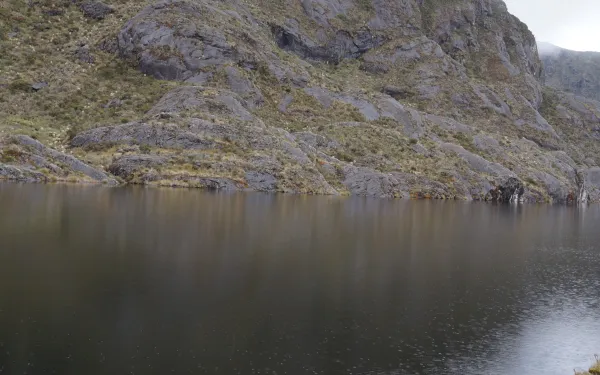
Declaration of a Temporary Reserve Area in the Santurbán Páramo is a victory for the defense of water in Latin America
Civil society organizations celebrate the measure taken by the Colombian Ministry of the Environment, which involves a two year suspension of Canadian company Aris Mining's gold mining project in the páramo.Bogotá, Colombia. The Interamerican Association for Environmental Defense (AIDA), the Institute for Policy Studies (IPS) - Mining and Trade Project, MiningWatch Canada, the Center for International Environmental Law (CIEL) and Common Frontiers Canada celebrate the Colombian Ministry of Environment and Sustainable Development’s (MADS) resolution that declares the western side of the Santurbán massif a temporary renewable natural resource reserve area. This major step strengthens the protection of one of the most emblematic high-altitude Andean wetlands, known as páramo, and its related ecosystems, which are fundamental for climate change adaptation and water security in the region for an estimated 2 million people.Resolution 0221, issued on March 3, 2025 by the Ministry of Environment and Sustainable Development (MADS), delimits and protects an area of 75,344.65 hectares, ensuring a two year provisional suspension of the Soto Norte gold mining project owned by Canadian company Aris Mining and its Colombian subsidiary, Sociedad Minera de Santander S.A.S. (Minesa), which puts Santurbán at risk. Citing the precautionary principle, the resolution prohibits the granting of “new mining concessions, special exploration and exploitation contracts, (...) as well as new environmental permits or licenses for the exploration or exploitation of minerals” in the area until the necessary technical studies are carried out toward its definitive protection. This resolution does not affect agricultural, livestock or tourism activity in the area.However, we are concerned that the resolution leaves in force the concession contract with Calimineros, which has had a subcontract with Minesa to formalize [its small-scale mining activities] since 2020, and from which Minesa promises to buy and process mineralized material. We encourage the competent authorities to suspend evaluation of its environmental license application and extension of the formalization subcontract, due to potential environmental impacts on Santurbán and because it is effectively part of the Soto Norte project.The páramo and related ecosystems are highly sensitive, recognized for their role in water regulation, carbon capture, and the conservation of endemic biodiversity. The removal of vegetation cover and the fragmentation of ecosystems that mining in Santurbán would generate could affect the ecological balance, biodiversity, and the provision of ecosystem services essential for life; acidify and reduce the amount of available fresh-water; and break the ecological interconnectivity with other biomes and ecosystems, destroying their capacity to sequester carbon and causing irreparable damage.For these reasons, we appreciate that the resolution seeks to prevent mining development in this highly sensitive and environmentally important area, preventing degradation of the watersheds that arise from Santurbán and preserving the water cycle.Sebastián Abad-Jara, an attorney for AIDA, pointed out that "by protecting Santurbán, Colombia ratifies its commitment to meet global environmental goals in terms of biodiversity, climate and wetlands, and sets a high bar for the governments of other countries where these ecosystems are similarly threatened by mining activity, such as Peru and Ecuador.""We celebrate this declaration as an important first step toward the consolidation of the western side of the Santurbán massif as a permanent reserve area, definitively protecting this important water source, vital for all who depend on it," said Jen Moore, associate fellow at IPS - Mining and Trade Project.Viviana Herrera, Latin America Program Coordinator for MiningWatch Canada, added that "this resolution is the result of the Committee for the Defence of Water and Páramo of Santurbán’s hard work, which has faced harassment and intimidation for its work in defense of the páramo, as well as disinformation campaigns about the supposed harmful effects of the resolution on agricultural activity."AIDA, IPS-Mining and Trade Project, MiningWatch Canada, CIEL and Common Frontiers Canada support the adoption of this protection measure for Santurbán. We also encourage the national and local government to carry out the necessary technical studies for its definitive protection, and to take preventive measures to avoid the cumulative environmental impacts of mining in the area given other projects that already have mining licenses. Furthermore, we reiterate the urgency of adopting measures to protect environment defenders in Colombia who stand up for the páramo.The Santurbán experience provides valuable lessons and should serve as an example to promote legislation for environmental protection in Latin America that focuses on the human right to water and the balance and integrity of fragile ecosystems, such as the páramo and other high-altitude ecosystems.#OurGoldIsWater Press contactsVictor Quintanilla (Mexico), AIDA, [email protected], +5215570522107Jennifer Moore, IPS, [email protected], +12027049011 (prensa IPS)Viviana Herrera, Mining Watch Canada, [email protected], +14389931264Alexandra Colón-Amil, CIEL, [email protected], +12024550253
Read more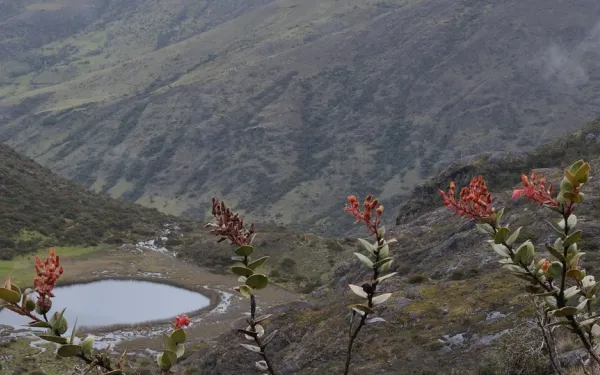
Declaration for the protection of the páramos and montane forests of the Tropical Andes
The undersigned civil society organizations, gathered in the framework of the 16th meeting of the Conference of the Parties (COP16) to the Convention on Biological Diversity (CBD) in Cali, Colombia: 1.URGE States Parties to the CBD to adopt domestic regulations and make international commitments to:recognize the crucial role of the páramos and the montane forest that protects them in global water regulation, mitigation and adaptation to the climate crisis, as well as in the conservation of biocultural diversity;protect the human rights, traditional knowledge and sustainable practices of indigenous peoples and peasant and traditional communities that inhabit the páramos and montane forest; andprohibit large-scale mining or similar practices in paramos and montane forests in terms of their socio-environmental impacts, in accordance with the principles of precaution and prevention. 2. REQUEST the States to include in their national biodiversity strategies and action plans indicators and monitoring mechanisms before the CBD that allow them to adequately measure and report compliance with the commitments they assume to advance in the conservation of these ecosystems under the terms of this declaration, as well as to guarantee the rights of the peoples and communities that inhabit them. 3. REQUIRE States and multilateral financial institutions to mobilize sufficient resources and technical capacities to guarantee the conservation of these ecosystems, as well as the protection of the indigenous peoples and peasant and traditional communities that inhabit them. We submit these requests to the States Parties to the CBD: Taking into account that there is a scientific consensus on the water regulatory power of the páramo and montane forest ecosystems[1] because they not only host endemic flora that captures freshwater from rain and fog, supplying it to the Andean cities located downstream; but also soils, lake and peatland systems that have a high concentration of organic matter and an enormous capacity to retain the liquid. In addition, the páramos wetlands are high Andean wetlands[2] under the protection of the Ramsar Convention on Wetlands of International Importance.Recognizing that páramos and their montane forests are fundamental in the carbon cycle; that due to low temperatures and the slow rate of decomposition of organic matter present in them, their soils, vegetation and wetlands capture and retain carbon dioxide (CO2)[3], contributing to climate change mitigation and adaptation and reducing the impact of meteorological events; and that these ecosystems are carbon sinks under the terms of the United Nations Framework Convention on Climate Change (UNFCCC).Reminding that, due to their biological and climatic characteristics, these ecosystems provide essential services for the population and contain biodiversity that is subject to special protection[4] and are home to endemic and native species of flora and fauna such as frailejones, pajonales, epiphytes, the chivito hummingbird, the Andean condor and the Andean bear, among others.Considering that the indigenous peoples and peasant and traditional communities of the region manage and protect the páramos and montane forests, ensure the preservation of common goods in their territories and are guardians of ancestral knowledge that is crucial for the conservation of biodiversity; that the integrity of the páramos is fundamental for the conservation of these ancestral practicess[5]; and that the páramos and montane forests are reserves of biocultural diversity within the framework of the CBD.Reiterating that the Intergovernmental Panel on Climate Change (IPCC)[6] warned of the impact of the climate crisis on páramos; and that they face other anthropogenic pressures such as fires, monocultures, livestock and invasive species[7].Warning that despite being strategic and sensitive ecosystems, deserving of the greatest protection, some of them are currently under strong pressure to develop large-scale mining projects, while others are at risk of being subject to mining concessions due to non-compliance with regulations and public policies that protect them or the lack of them.Bearing in mind that indigenous peoples and peasant and traditional communities have rejected these mining projects in their territories, even winning by majority vote "popular consultations" with which they have succeeded in defending the use of the land for traditional activities in their territories.Insisting that the removal of vegetation cover and the fragmentation of ecosystems generated by large-scale mining can affect the ecological balance, biocultural diversity and the provision of ecosystem services essential for life; acidify and reduce the amount of freshwater available for life systems; and break ecological and spiritual interconnectivity with other biomes and ecosystems, ending their capacity to capture carbon[8] and causing impacts in perpetuity.Following the warnings made by several UN rapporteurs and working groups on the negative impacts of mining on the environment and on human rights[9].Warning about certain dynamics recently employed by some mining companies in the countries of the region, particularly multinationals -such as the splitting of large mining titles, the change of exploitation method from surface to underground mining, as well as the formalization of small-scale miners in the area to outsource their activities by requesting multiple smaller areas-, which threaten to disguise large-scale mining processes with cumulative and synergistic environmental impacts on páramo ecosystems and montane forests that can be equal or more serious than those of a large-scale mining concession.Recalling that under the CBD States are required to: (i) monitor activities that have or are likely to have significant adverse effects on the conservation and sustainable use of biological diversity[10], such as mining; (ii) establish protected areas for biodiversity conservation[11] based on the traditional knowledge of indigenous peoples and peasant and traditional communities[12]; and (iii) adopt emergency measures when there are serious and imminent risks to biological diversity from natural or other events[13], such as risk from extractive activities. Signed byCentro Sociojurídico para la Defensa Territorial Siembra (Colombia)Colectivo Socio-Ambiental Juvenil de Cajamarca COSAJUCA (Colombia)Comité para la Defensa del Agua y el Páramo de Santurbán (Colombia)Consejo Territorial de Cabildos de la Sierra Nevada de Gonawindua CTC (Colombia)Corporación Ecológica y Cultural Penca de Sábila (Colombia)Movimiento Socioambiental Kumanday (Colombia)Natural Seeds Alliance (Colombia)Proyecto Dulcepamba (Ecuador)Acción Ecológica (Ecuador)Latinoamérica Sustentable (Ecuador)Unión de Defensores del Agua - UNAGUA (Ecuador)Federación de Organizaciones Indígenas y Campesinas del Azuay - FOA (Ecuador)Alianza de Organizaciones por los Derechos Humanos del Ecuador (Ecuador)Legal Defense Institute - IDL (Peru)Red Muqui (Perú)Red Internacional de Forestería Análoga - RIFA (Costa Rica)Mining Watch Canadá (Canada)Both ENDS (Netherlands)Redes del Agua Latinoamérica (Regional)Interamerican Association for Environmental Defense - AIDA (Regional)[1]Buytaert W. et al. Hidrología del páramo andino: propiedades, importancia y vulnerabilidad. Lovaina, U. de Lovaina, s.f.,, p. 10, 11, 23.[2] COP del Convenio de Ramsar, Resolución VIII.39. Los humedales altoandinos como sistemas estratégicos. Valencia, 2002.[3] Robert Hofstede et al. “Los páramos del Ecuador: Pasado, presente y futuro”, capítulo 12, págs 328 – 330, 2023[4] Robert Hofstede et al. págs 158 – 163, 2023.[5] IPBES (2018). The IPBES Regional Assessment Report on Biodiversity and Ecosystem Services for the Americas. Recuperado de: https://www.ipbes.net/assessment-reports/americas[6] IPCC (2013). Panel Intergubernamental de Cambio Climático, Quinto Informe de Evaluación, Recuperado de: http://www.ipcc.ch/home_languages_main_spanish.shtml[7] Ochoa-Tocachi et al., 2016, Tomado de IPBES (2018).[8] Madriñán, S., Cortés, A. J., & Richardson, J. E. (2013). Páramo is the world's fastest evolving and coolest biodiversity hotspot. Frontiers in genetics, 192.[9] Asamble General de la ONU, (i) Relatoría Especial sobre derechos humanos y sustancias y desechos peligrosos. Asamblea General de la ONU. A/HRC/51/35, 8 de julio de 2022, (ii) Relatoría Especial sobre el derecho humano a un medio ambiente limpio, saludable y sostenible. A/79/270, 2 de agosto de 2024, (iii) Grupo de Trabajo sobre la cuestión de los derechos humanos y las empresas transnacionales. Asamblea General de la ONU. A/78/155, 11 de julio de 2023.[10] Convenio sobre la Diversidad Biológica, Art. 7.C.[11] Ibid. Art. 8.C. CDB.[12] Ibid. Art. 8.J CDB.[13] Ibid. Art. 14.E. CDB.
Read more